-
 Bitcoin
Bitcoin $84,140.6204
-0.65% -
 Ethereum
Ethereum $1,571.7107
-1.08% -
 Tether USDt
Tether USDt $0.9999
-0.01% -
 XRP
XRP $2.0657
-1.57% -
 BNB
BNB $587.0749
0.63% -
 Solana
Solana $131.5042
2.64% -
 USDC
USDC $0.9999
0.00% -
 TRON
TRON $0.2477
-2.84% -
 Dogecoin
Dogecoin $0.1541
-0.47% -
 Cardano
Cardano $0.6147
0.44% -
 UNUS SED LEO
UNUS SED LEO $9.0845
-3.46% -
 Chainlink
Chainlink $12.3082
-0.44% -
 Avalanche
Avalanche $18.9724
-0.49% -
 Toncoin
Toncoin $2.9419
1.59% -
 Stellar
Stellar $0.2373
-0.06% -
 Shiba Inu
Shiba Inu $0.0...01167
-1.19% -
 Sui
Sui $2.0762
-1.59% -
 Hedera
Hedera $0.1594
0.08% -
 Bitcoin Cash
Bitcoin Cash $329.6626
2.63% -
 Polkadot
Polkadot $3.5903
0.80% -
 Litecoin
Litecoin $74.4026
-0.45% -
 Hyperliquid
Hyperliquid $16.1660
1.52% -
 Dai
Dai $1.0000
-0.01% -
 Bitget Token
Bitget Token $4.3245
-0.26% -
 Ethena USDe
Ethena USDe $0.9991
-0.01% -
 Pi
Pi $0.6112
-1.00% -
 Monero
Monero $215.3188
-1.23% -
 Uniswap
Uniswap $5.1249
-1.18% -
 OKB
OKB $50.3147
-2.91% -
 Pepe
Pepe $0.0...07131
-0.66%
Analysis of the advantages and disadvantages of hot wallets and cold wallets
Hot wallets offer easy access and lower fees but are vulnerable to hacking, while cold wallets provide superior security for long-term crypto storage but are less convenient.
Apr 07, 2025 at 06:21 pm
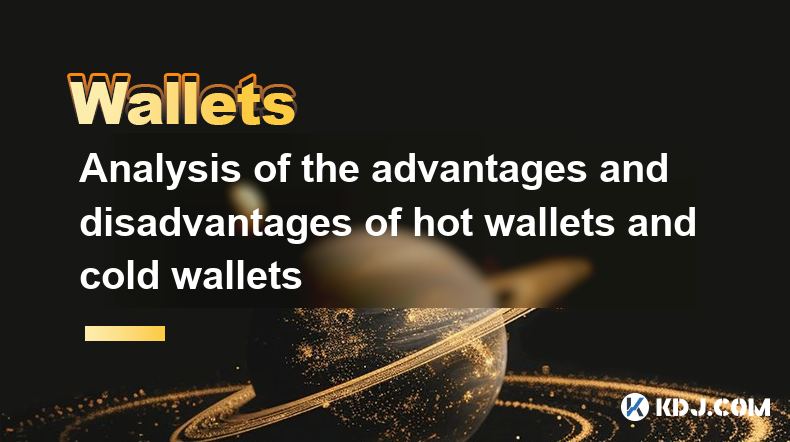
Hot wallets and cold wallets are two primary types of cryptocurrency storage solutions, each with its own set of advantages and disadvantages. Hot wallets are connected to the internet and are typically used for frequent transactions, while cold wallets are offline and provide a higher level of security for long-term storage. Understanding the pros and cons of each type of wallet is crucial for any cryptocurrency investor to make informed decisions about their digital asset management.
Advantages of Hot Wallets
Hot wallets offer several benefits that make them an attractive option for many cryptocurrency users. One of the primary advantages is ease of access. Since hot wallets are connected to the internet, users can quickly and conveniently access their funds to make transactions. This makes hot wallets ideal for those who need to frequently buy, sell, or trade cryptocurrencies.
Another significant advantage of hot wallets is user-friendliness. Many hot wallets come with intuitive interfaces and are designed to be user-friendly, making them accessible even to those new to the world of cryptocurrencies. Additionally, hot wallets often support a wide range of cryptocurrencies, allowing users to manage multiple digital assets within a single platform.
Hot wallets also tend to have lower fees compared to some cold wallet solutions. Since they are designed for frequent transactions, many hot wallet providers offer competitive fee structures to attract users. This can be particularly beneficial for those who engage in frequent trading or need to make regular payments with their cryptocurrencies.
Disadvantages of Hot Wallets
Despite their advantages, hot wallets also come with several drawbacks that users should be aware of. The most significant disadvantage is vulnerability to hacking. Since hot wallets are connected to the internet, they are more susceptible to cyberattacks. Hackers can exploit vulnerabilities in the wallet's software or target the user's device to steal funds.
Another disadvantage of hot wallets is potential for human error. Users must take responsibility for securing their wallet with strong passwords and enabling two-factor authentication. If a user's device is compromised or if they fall victim to phishing attacks, their funds could be at risk. Additionally, hot wallets often rely on third-party services, which introduces another layer of risk if the service provider experiences security breaches or goes out of business.
Hot wallets may also have limited storage capacity. Some hot wallet providers impose limits on the amount of cryptocurrency that can be stored in a single wallet. This can be a disadvantage for users who hold large amounts of digital assets and prefer to keep them in a single, easily accessible location.
Advantages of Cold Wallets
Cold wallets offer several compelling advantages that make them an attractive option for long-term cryptocurrency storage. The most significant benefit of cold wallets is enhanced security. Since cold wallets are not connected to the internet, they are immune to online hacking attempts and cyberattacks. This makes them an ideal solution for storing large amounts of cryptocurrency for extended periods.
Another advantage of cold wallets is control over private keys. With cold wallets, users have complete control over their private keys, which are the essential pieces of information needed to access and manage their cryptocurrency. This gives users greater peace of mind, as they are not reliant on third-party services to secure their funds.
Cold wallets also offer protection against malware and phishing attacks. Since they are offline, users do not need to worry about their devices being compromised by malicious software or falling victim to phishing scams. This added layer of security can be particularly appealing to those who are concerned about the growing threat of cybercrime in the cryptocurrency space.
Disadvantages of Cold Wallets
While cold wallets offer superior security, they also come with several disadvantages that users should consider. One of the primary drawbacks is less convenient access. Since cold wallets are not connected to the internet, users must go through additional steps to access their funds and make transactions. This can be time-consuming and may not be suitable for those who need to frequently buy, sell, or trade cryptocurrencies.
Another disadvantage of cold wallets is potential for loss or damage. Since cold wallets often take the form of physical devices or paper wallets, there is a risk of losing them or having them damaged. If a user loses their cold wallet or it is destroyed, they may permanently lose access to their funds if they do not have proper backups of their private keys.
Cold wallets can also be more expensive than hot wallets. Hardware wallets, which are a popular type of cold wallet, often come with a higher upfront cost compared to software-based hot wallets. Additionally, some cold wallet solutions may require users to pay for additional features or services, such as secure storage or backup options.
Choosing Between Hot and Cold Wallets
When deciding between hot and cold wallets, it's essential to consider your specific needs and risk tolerance. For those who prioritize convenience and need to frequently access their funds, a hot wallet may be the better choice. However, if security is your top concern and you plan to hold your cryptocurrencies for the long term, a cold wallet could be more suitable.
It's also worth noting that many cryptocurrency users opt for a hybrid approach, using both hot and cold wallets to balance convenience and security. For example, a user might keep a small amount of cryptocurrency in a hot wallet for daily transactions while storing the majority of their funds in a cold wallet for long-term storage.
Ultimately, the choice between hot and cold wallets depends on your individual circumstances and preferences. By carefully weighing the advantages and disadvantages of each type of wallet, you can make an informed decision that aligns with your cryptocurrency management goals.
Common Questions About Hot and Cold Wallets
Q: What is the main difference between a hot wallet and a cold wallet?
A: The primary difference between hot and cold wallets is their connection to the internet. Hot wallets are connected to the internet and designed for frequent transactions, while cold wallets are offline and provide enhanced security for long-term storage.
Q: Are hot wallets safe to use?
A: Hot wallets can be safe to use if proper security measures are in place, such as strong passwords, two-factor authentication, and keeping software up to date. However, they are more vulnerable to hacking and cyberattacks compared to cold wallets.
Q: Can I use both a hot wallet and a cold wallet?
A: Yes, many cryptocurrency users employ a hybrid approach, using both hot and cold wallets. They might keep a small amount of cryptocurrency in a hot wallet for daily transactions while storing the majority of their funds in a cold wallet for long-term security.
Q: How do I choose the right type of wallet for my needs?
A: When choosing a wallet, consider factors such as your frequency of transactions, the amount of cryptocurrency you plan to store, your security concerns, and your level of technical expertise. If you need frequent access to your funds, a hot wallet may be more suitable. For long-term storage and enhanced security, a cold wallet is often preferred.
Q: What should I do if I lose my cold wallet?
A: If you lose your cold wallet, it's crucial to have backups of your private keys or recovery phrases. Without these, you may permanently lose access to your funds. Always store backups in secure, offline locations and consider using multiple backup methods for added redundancy.
Q: Are there any alternatives to hot and cold wallets?
A: Yes, there are other types of cryptocurrency storage solutions, such as paper wallets, which are physical documents containing your public and private keys, and multi-signature wallets, which require multiple signatures to authorize transactions. Each of these alternatives has its own set of advantages and disadvantages, and the best choice depends on your specific needs and preferences.
Disclaimer:info@kdj.com
The information provided is not trading advice. kdj.com does not assume any responsibility for any investments made based on the information provided in this article. Cryptocurrencies are highly volatile and it is highly recommended that you invest with caution after thorough research!
If you believe that the content used on this website infringes your copyright, please contact us immediately (info@kdj.com) and we will delete it promptly.
- Kaspa (KAS) Price Prediction Hints at Accumulation Before Potential Surge
- 2025-04-17 22:15:13
- FET Price Prediction: Artificial Superintelligence Alliance (FET) Cryptocurrency Rebounds 10%
- 2025-04-17 22:15:13
- U.S. President Donald Trump Slammed Fed Chair Jerome Powell
- 2025-04-17 22:15:12
- Running a laundromat can't be as "easy" as potential investors may believe it is
- 2025-04-17 22:15:12
- BlockDAG (BDAG) Presale Explosion and Mobile Mining Powerhouse
- 2025-04-17 22:05:12
- Solana (SOL) Price Prediction: Eyes on $180 as Structure Turns Bullish
- 2025-04-17 22:05:12
Related knowledge
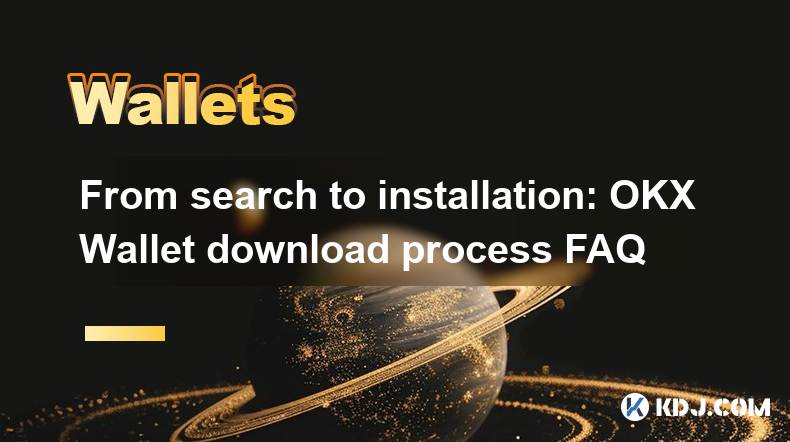
From search to installation: OKX Wallet download process FAQ
Apr 17,2025 at 02:00pm
The OKX Wallet is a popular choice among cryptocurrency enthusiasts for managing their digital assets securely and efficiently. Understanding the process from searching for the wallet to its installation can be crucial for new users. This article will guide you through the entire process, providing detailed steps and answers to frequently asked question...
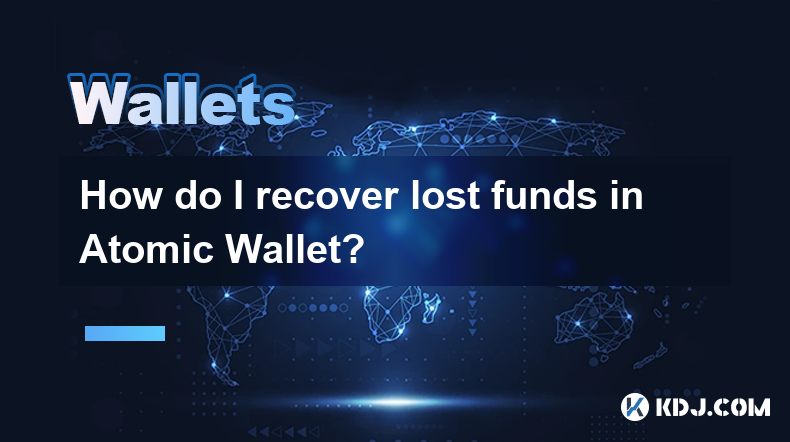
How do I recover lost funds in Atomic Wallet?
Apr 17,2025 at 01:49pm
Recovering lost funds in Atomic Wallet can be a challenging process, but with the right approach, you can increase your chances of success. Atomic Wallet is a popular decentralized wallet that allows users to manage a wide range of cryptocurrencies. If you've lost access to your funds, it's crucial to understand the steps you can take to recover them. U...
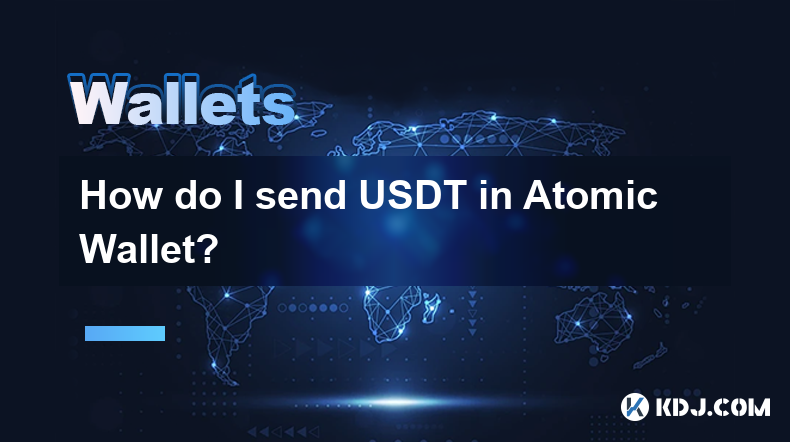
How do I send USDT in Atomic Wallet?
Apr 17,2025 at 03:15pm
Sending USDT (Tether) in Atomic Wallet is a straightforward process that ensures secure and efficient transactions. In this article, we will walk you through the steps required to send USDT using Atomic Wallet, ensuring that you understand each step thoroughly. Let's dive into the details. Preparing for the TransactionBefore you start the process of sen...
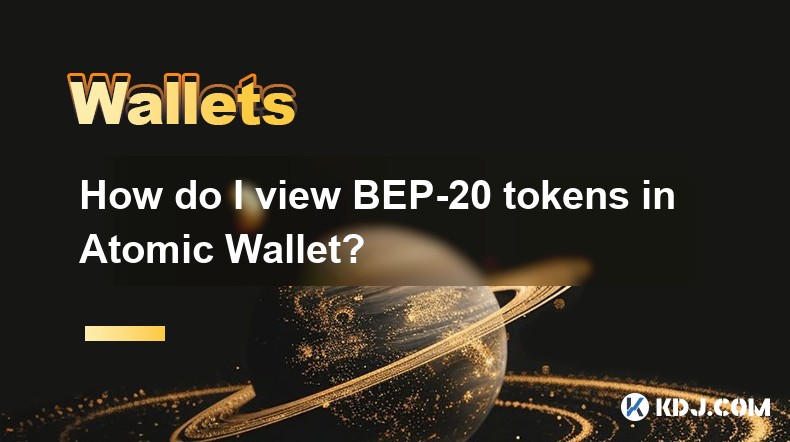
How do I view BEP-20 tokens in Atomic Wallet?
Apr 17,2025 at 12:28pm
To view BEP-20 tokens in Atomic Wallet, you need to follow a series of straightforward steps. Atomic Wallet supports a wide range of cryptocurrencies, including BEP-20 tokens which are tokens based on the Binance Smart Chain (BSC). Let's dive into the detailed process of adding and viewing these tokens within your wallet. Understanding BEP-20 TokensBEP-...
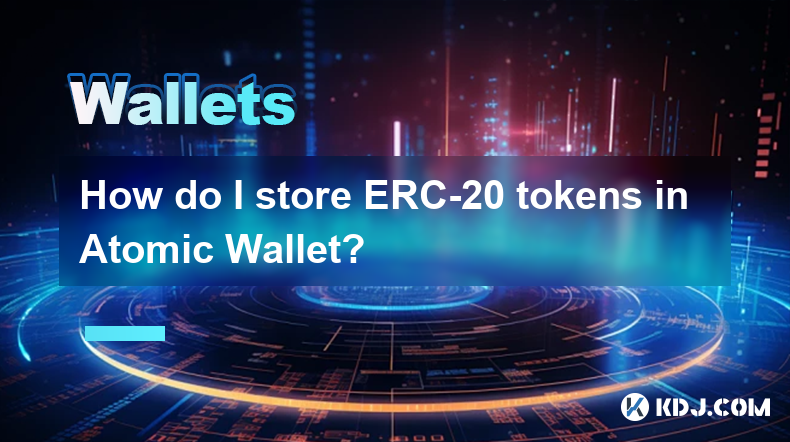
How do I store ERC-20 tokens in Atomic Wallet?
Apr 17,2025 at 06:07pm
Storing ERC-20 tokens in Atomic Wallet is a straightforward process that ensures your digital assets remain secure and accessible. Atomic Wallet is a decentralized, multi-currency wallet that supports over 300 cryptocurrencies, including ERC-20 tokens. This guide will walk you through the steps needed to store your ERC-20 tokens safely within Atomic Wal...
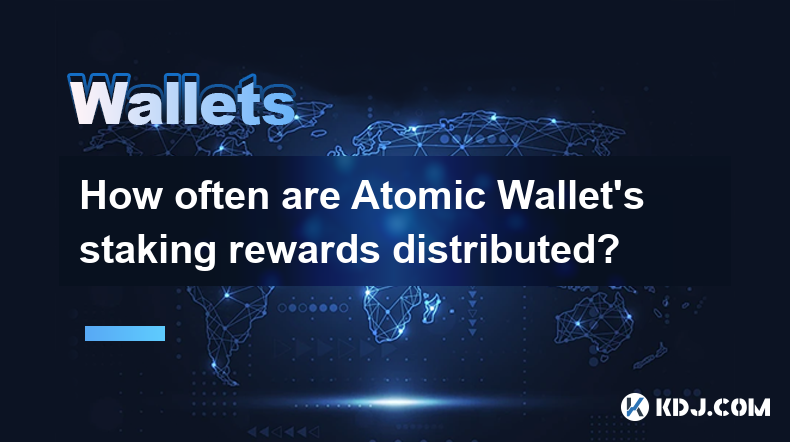
How often are Atomic Wallet's staking rewards distributed?
Apr 17,2025 at 09:36pm
How often are Atomic Wallet's staking rewards distributed? Atomic Wallet is a popular non-custodial cryptocurrency wallet that supports a wide range of cryptocurrencies and offers staking services for various assets. Staking allows users to earn rewards by holding and supporting the operations of a blockchain network. One of the common questions among u...

From search to installation: OKX Wallet download process FAQ
Apr 17,2025 at 02:00pm
The OKX Wallet is a popular choice among cryptocurrency enthusiasts for managing their digital assets securely and efficiently. Understanding the process from searching for the wallet to its installation can be crucial for new users. This article will guide you through the entire process, providing detailed steps and answers to frequently asked question...

How do I recover lost funds in Atomic Wallet?
Apr 17,2025 at 01:49pm
Recovering lost funds in Atomic Wallet can be a challenging process, but with the right approach, you can increase your chances of success. Atomic Wallet is a popular decentralized wallet that allows users to manage a wide range of cryptocurrencies. If you've lost access to your funds, it's crucial to understand the steps you can take to recover them. U...

How do I send USDT in Atomic Wallet?
Apr 17,2025 at 03:15pm
Sending USDT (Tether) in Atomic Wallet is a straightforward process that ensures secure and efficient transactions. In this article, we will walk you through the steps required to send USDT using Atomic Wallet, ensuring that you understand each step thoroughly. Let's dive into the details. Preparing for the TransactionBefore you start the process of sen...

How do I view BEP-20 tokens in Atomic Wallet?
Apr 17,2025 at 12:28pm
To view BEP-20 tokens in Atomic Wallet, you need to follow a series of straightforward steps. Atomic Wallet supports a wide range of cryptocurrencies, including BEP-20 tokens which are tokens based on the Binance Smart Chain (BSC). Let's dive into the detailed process of adding and viewing these tokens within your wallet. Understanding BEP-20 TokensBEP-...

How do I store ERC-20 tokens in Atomic Wallet?
Apr 17,2025 at 06:07pm
Storing ERC-20 tokens in Atomic Wallet is a straightforward process that ensures your digital assets remain secure and accessible. Atomic Wallet is a decentralized, multi-currency wallet that supports over 300 cryptocurrencies, including ERC-20 tokens. This guide will walk you through the steps needed to store your ERC-20 tokens safely within Atomic Wal...

How often are Atomic Wallet's staking rewards distributed?
Apr 17,2025 at 09:36pm
How often are Atomic Wallet's staking rewards distributed? Atomic Wallet is a popular non-custodial cryptocurrency wallet that supports a wide range of cryptocurrencies and offers staking services for various assets. Staking allows users to earn rewards by holding and supporting the operations of a blockchain network. One of the common questions among u...
See all articles























































































